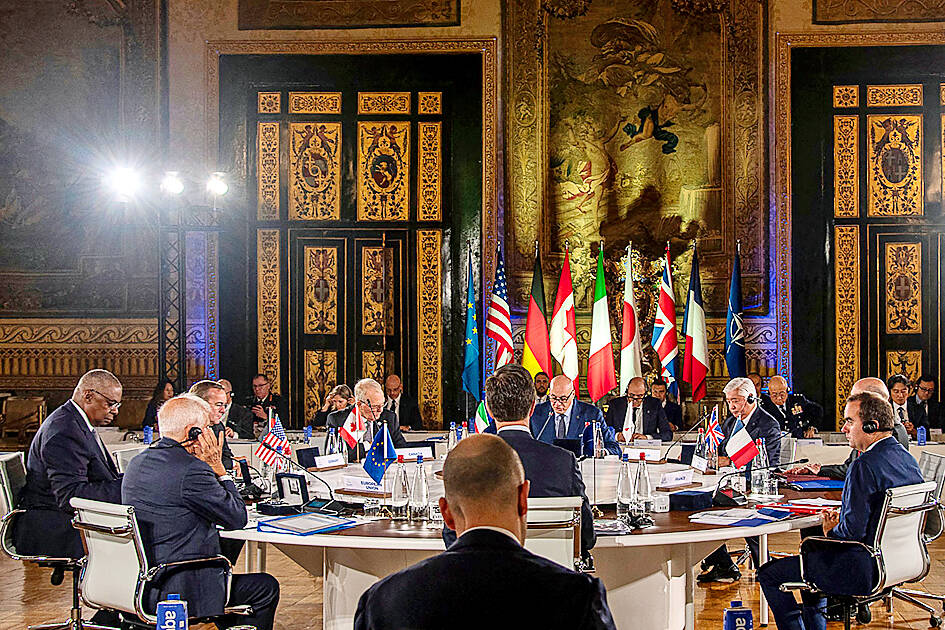G7 defense ministers in a joint statement on Saturday singled out China over a number of concerns, including its “provocative actions” near Taiwan.
The defense ministers of Canada, France, Germany, Italy, Japan, the UK and the US gathered in Naples, Italy, from Friday to yesterday for the group’s first ministerial meeting dedicated to defense.
In the joint declaration, they stressed “enduring unity and common determination to address, in a cohesive and concrete manner, security challenges, at a time in history marked by great instability.”

Photo: Massimiliano De Giorgi / Italian Ministry of Defense / AFP
In addition to voicing support for Ukraine, expressing concern about the escalating conflict in the Middle East and condemning North Korea’s nuclear and ballistic missile programs, the ministers affirmed their “commitment to a free and open Indo-Pacific, based on the rule of law and upholding the principle of the peaceful resolution of disputes without resorting to the threat or use of force.”
“We reaffirm that maintaining peace and stability across the Taiwan Strait is indispensable to international security and prosperity,” it said. “We are concerned about provocative actions, particularly the recent [Chinese] People’s Liberation Army military drills around Taiwan.”
“We call for a peaceful resolution of cross-strait issues,” it added.
The declaration also expressed concern about the situation in the South China Sea.
“There is no legal basis for China’s expansive maritime claims in the South China Sea, and we are strongly opposed to China’s repeated obstruction of freedom of navigation, militarization of disputed features, and coercive and intimidating activities, as well as the dangerous use of coast guard and maritime militia vessels in the South China Sea,” it said.
They also expressed their “deep concern at China’s increasing support to Russia’s war economy” and the “destabilizing actions resulting from the strengthening military cooperation between China and Russia.”
In Taipei, the Ministry of Foreign Affairs thanked the G7 defense ministers for their firm support in maintaining the peaceful “status quo” in the Taiwan Strait.
As a responsible member of the Indo-Pacific region, Taiwan would continue to strengthen cooperation with G7 nations and take concrete actions to defend the universal values of democracy, freedom and human rights, it said.
Separately, the Australian Taiwanese Friendship Association (ATFA) on Saturday expressed gratitude to the Australian Senate, which on Aug. 21 unanimously passed a motion stating that UN General Assembly Resolution 2758 does not establish the People’s Republic of China’s sovereignty over Taiwan and does not determine the future status of Taiwan in the UN.
New ATFA president Kathy Sieh (謝明君) made the remark at the 27th inauguration ceremony of the association in Sydney.
Taiwanese in Australia urged the Australian government to take a leadership role in advocating for Taiwan’s participation in international organizations, she said, adding that the presidents of other Taiwanese friendship associations in Australia and Taiwan-related civic groups also gathered at the ceremony to show their support for Taiwan’s participation in the UN.

MORE VISITORS: The Tourism Administration said that it is seeing positive prospects in its efforts to expand the tourism market in North America and Europe Taiwan has been ranked as the cheapest place in the world to travel to this year, based on a list recommended by NerdWallet. The San Francisco-based personal finance company said that Taiwan topped the list of 16 nations it chose for budget travelers because US tourists do not need visas and travelers can easily have a good meal for less than US$10. A bus ride in Taipei costs just under US$0.50, while subway rides start at US$0.60, the firm said, adding that public transportation in Taiwan is easy to navigate. The firm also called Taiwan a “food lover’s paradise,” citing inexpensive breakfast stalls

TRADE: A mandatory declaration of origin for manufactured goods bound for the US is to take effect on May 7 to block China from exploiting Taiwan’s trade channels All products manufactured in Taiwan and exported to the US must include a signed declaration of origin starting on May 7, the Bureau of Foreign Trade announced yesterday. US President Donald Trump on April 2 imposed a 32 percent tariff on imports from Taiwan, but one week later announced a 90-day pause on its implementation. However, a universal 10 percent tariff was immediately applied to most imports from around the world. On April 12, the Trump administration further exempted computers, smartphones and semiconductors from the new tariffs. In response, President William Lai’s (賴清德) administration has introduced a series of countermeasures to support affected

CROSS-STRAIT: The vast majority of Taiwanese support maintaining the ‘status quo,’ while concern is rising about Beijing’s influence operations More than eight out of 10 Taiwanese reject Beijing’s “one country, two systems” framework for cross-strait relations, according to a survey released by the Mainland Affairs Council (MAC) on Thursday. The MAC’s latest quarterly survey found that 84.4 percent of respondents opposed Beijing’s “one country, two systems” formula for handling cross-strait relations — a figure consistent with past polling. Over the past three years, opposition to the framework has remained high, ranging from a low of 83.6 percent in April 2023 to a peak of 89.6 percent in April last year. In the most recent poll, 82.5 percent also rejected China’s

PLUGGING HOLES: The amendments would bring the legislation in line with systems found in other countries such as Japan and the US, Legislator Chen Kuan-ting said Democratic Progressive Party (DPP) Legislator Chen Kuan-ting (陳冠廷) has proposed amending national security legislation amid a spate of espionage cases. Potential gaps in security vetting procedures for personnel with access to sensitive information prompted him to propose the amendments, which would introduce changes to Article 14 of the Classified National Security Information Protection Act (國家機密保護法), Chen said yesterday. The proposal, which aims to enhance interagency vetting procedures and reduce the risk of classified information leaks, would establish a comprehensive security clearance system in Taiwan, he said. The amendment would require character and loyalty checks for civil servants and intelligence personnel prior to